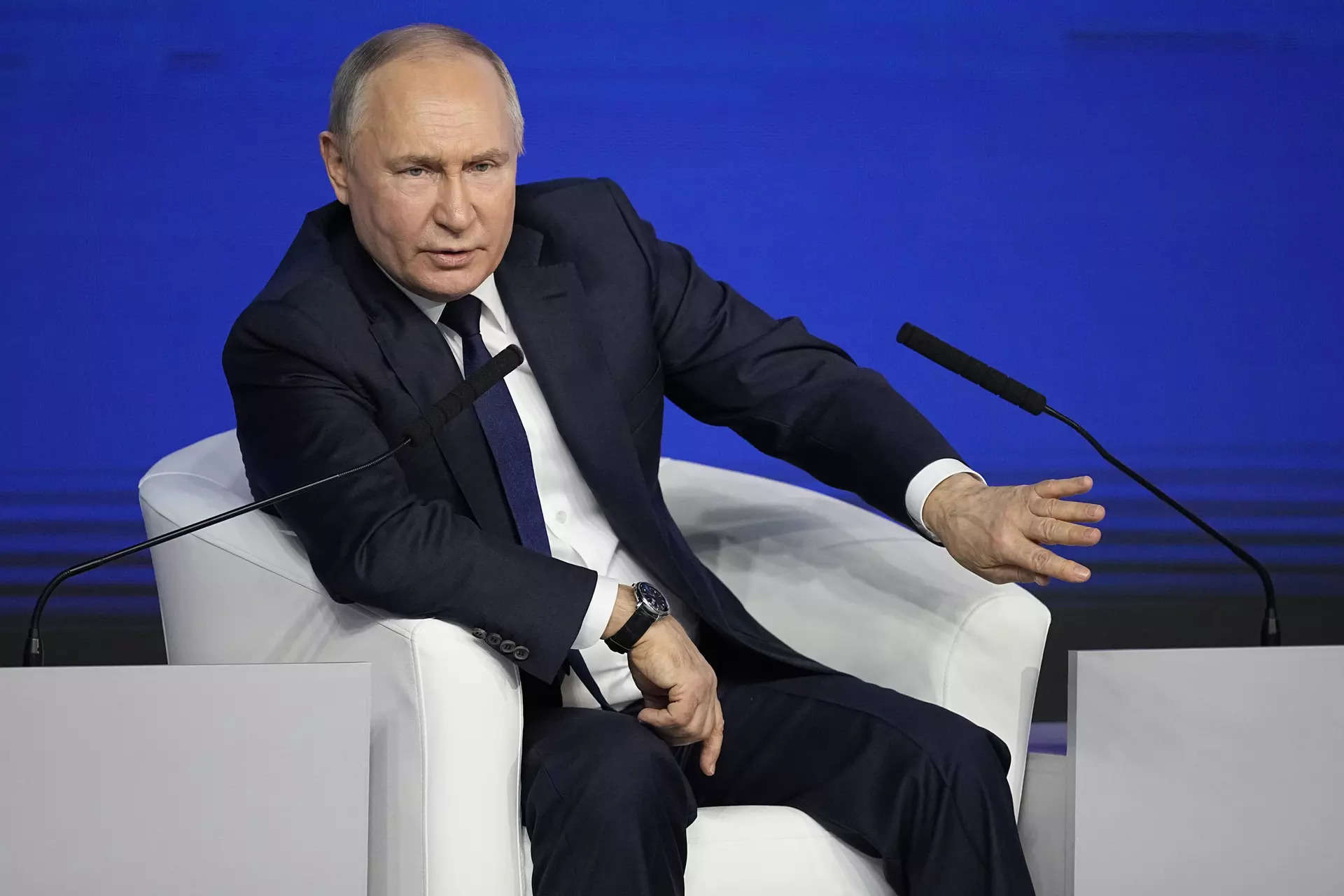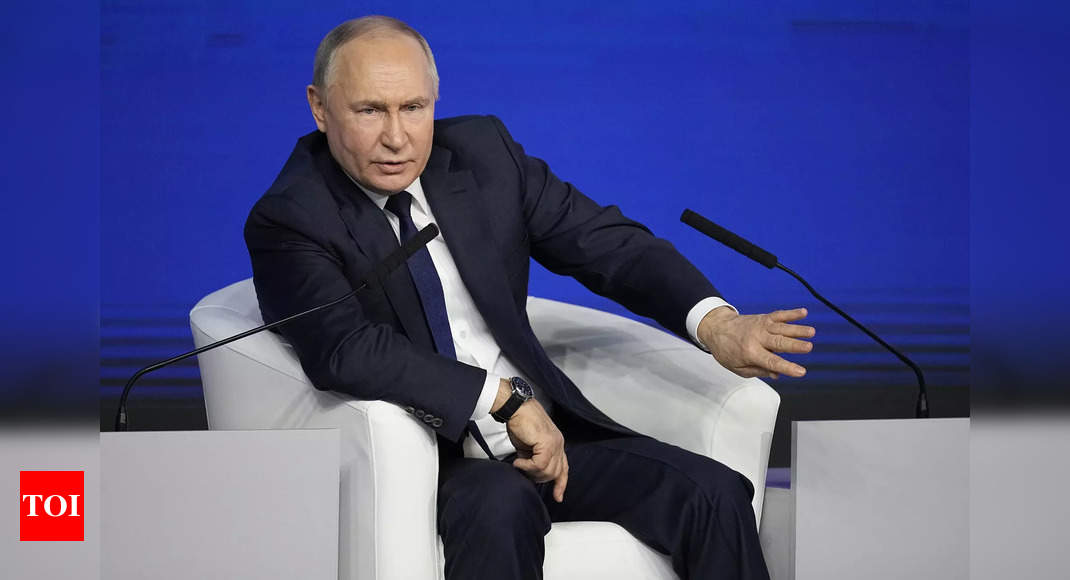
Russia is turning its sights on prominent anti-war critics of President Vladimir Putin who’ve fled abroad, following the Kremlin’s unprecedented crackdown on domestic opponents of his invasion of Ukraine.
The Foreign Ministry in Moscow has told its diplomats to pursue Russian artists and celebrities who speak out against Putin and in support of Ukraine from so-called “friendly” countries that have avoided taking sides over the war, according to two people familiar with the matter.
Members of Bi-2, a self-exiled rock band known for its opposition to the war, were at the center of a diplomatic tussle in Thailand this week after being detained for breaking immigration rules while performing two concerts at the resort island of Phuket.
Moscow sought to have Russian citizens in the seven-member group deported back to the country, raising concerns among human rights groups that they risked arrest and prosecution. Five of the group held Russian passports, but with four members having Israeli citizenship and one also Australian, Thai authorities eventually opted instead to send them all to Israel after interventions by the Foreign Ministry in Jerusalem.
An estimated 1 million Russians have left the country since Putin’s February 2022 invasion of Ukraine, the largest brain drain since the collapse of the Soviet Union. They include high-profile cultural figures who’ve voiced opposition to the war and an increasing number of people that Russian authorities have branded as “foreign agents,” leaving them vulnerable to prosecution.
“The authorities’ major fear now is that people living abroad are getting their message across to a Russian audience,” said Ekaterina Schulmann, a Berlin-based political scientist who was declared a “foreign agent” shortly after Russia invaded Ukraine. “They want to silence them.”
Lawmakers in Moscow on Wednesday also passed a law allowing for the confiscation of property belonging to people who “discredit” the Russian military by criticizing the war in Ukraine.
“An absolute majority are in favor of the need to punish traitors who, from abroad, pour dirt on our country, soldiers and officers,” Vyacheslav Volodin, a Putin ally who’s speaker of the lower house of parliament, said Wednesday.
The government also plans to oblige Russian citizens living abroad to register with consular authorities by mid-2025.
The Foreign Ministry’s spokeswoman, Maria Zakharova, on Saturday accused Bi-2 of sponsoring terrorism by publicly supporting Ukraine. A pro-government lawmaker, Andrei Lugovoi, found by a UK inquiry to have poisoned dissident Russian spy Alexander Litvinenko in London in 2006, went further.
“Let the guys get ready: soon they will be playing and singing on spoons and on metal plates, tap dancing in front of their cellmates,” he said on Telegram.
Maxim Galkin, a comedian now based in Israel, said he was barred from entering the Indonesian island of Bali for a planned show on Saturday despite having received a work visa two days before.
Galkin, whose shows in Thailand were recently canceled by owners of the venues, said on Instagram that passport officers in Bali showed him a letter from the Russian government requesting Indonesia keep him out of the country.
“It’s amusing that the Russian state wastes the time and effort of so many people on this, who could do something better for the homeland than the manic persecution of dissenting artists abroad,” he said.
The Foreign Ministry in Moscow has told its diplomats to pursue Russian artists and celebrities who speak out against Putin and in support of Ukraine from so-called “friendly” countries that have avoided taking sides over the war, according to two people familiar with the matter.
Members of Bi-2, a self-exiled rock band known for its opposition to the war, were at the center of a diplomatic tussle in Thailand this week after being detained for breaking immigration rules while performing two concerts at the resort island of Phuket.
Moscow sought to have Russian citizens in the seven-member group deported back to the country, raising concerns among human rights groups that they risked arrest and prosecution. Five of the group held Russian passports, but with four members having Israeli citizenship and one also Australian, Thai authorities eventually opted instead to send them all to Israel after interventions by the Foreign Ministry in Jerusalem.
An estimated 1 million Russians have left the country since Putin’s February 2022 invasion of Ukraine, the largest brain drain since the collapse of the Soviet Union. They include high-profile cultural figures who’ve voiced opposition to the war and an increasing number of people that Russian authorities have branded as “foreign agents,” leaving them vulnerable to prosecution.
“The authorities’ major fear now is that people living abroad are getting their message across to a Russian audience,” said Ekaterina Schulmann, a Berlin-based political scientist who was declared a “foreign agent” shortly after Russia invaded Ukraine. “They want to silence them.”
Lawmakers in Moscow on Wednesday also passed a law allowing for the confiscation of property belonging to people who “discredit” the Russian military by criticizing the war in Ukraine.
“An absolute majority are in favor of the need to punish traitors who, from abroad, pour dirt on our country, soldiers and officers,” Vyacheslav Volodin, a Putin ally who’s speaker of the lower house of parliament, said Wednesday.
The government also plans to oblige Russian citizens living abroad to register with consular authorities by mid-2025.
The Foreign Ministry’s spokeswoman, Maria Zakharova, on Saturday accused Bi-2 of sponsoring terrorism by publicly supporting Ukraine. A pro-government lawmaker, Andrei Lugovoi, found by a UK inquiry to have poisoned dissident Russian spy Alexander Litvinenko in London in 2006, went further.
“Let the guys get ready: soon they will be playing and singing on spoons and on metal plates, tap dancing in front of their cellmates,” he said on Telegram.
Maxim Galkin, a comedian now based in Israel, said he was barred from entering the Indonesian island of Bali for a planned show on Saturday despite having received a work visa two days before.
Galkin, whose shows in Thailand were recently canceled by owners of the venues, said on Instagram that passport officers in Bali showed him a letter from the Russian government requesting Indonesia keep him out of the country.
“It’s amusing that the Russian state wastes the time and effort of so many people on this, who could do something better for the homeland than the manic persecution of dissenting artists abroad,” he said.
Source link

